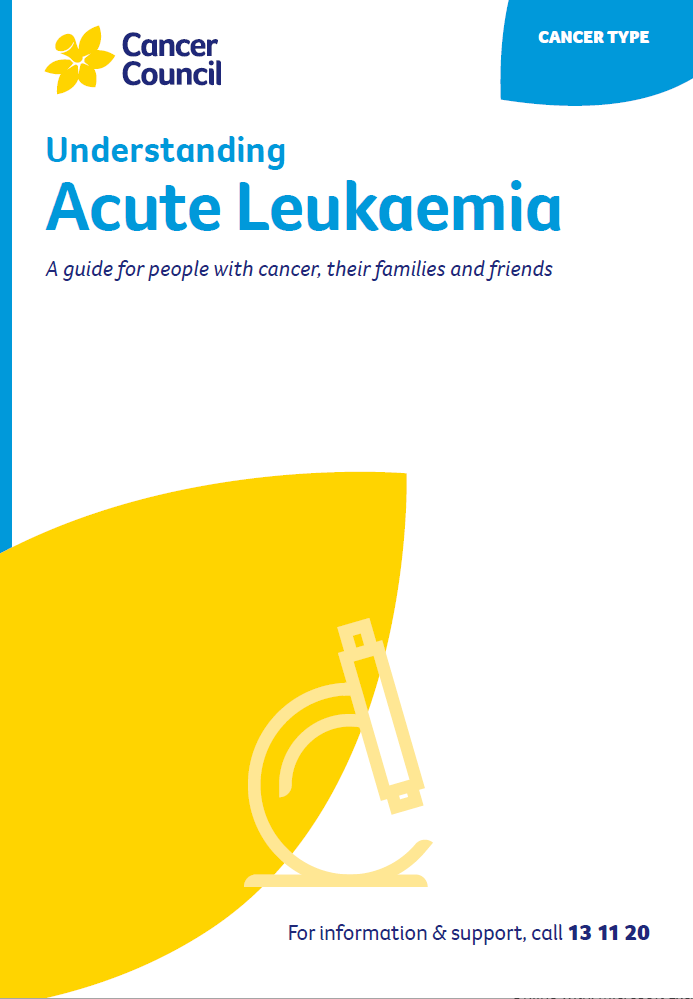- Home
- Acute myeloid leukaemia (AML)
- Diagnosis
- Your health care team
Your health care team
Your general practitioner (GP) will often arrange the first tests to assess your symptoms. If these tests do not rule out leukaemia, you will usually be referred to another specialist called a haematologist or to the emergency department of the nearest major hospital (as you may need immediate treatment). You will then have further tests.
If acute myeloid leukaemia is diagnosed, the specialist will consider treatment options. Often these will be discussed with other health professionals at what is known as a multidisciplinary team (MDT) meeting. During and after treatment, you will see a range of health professionals who specialise in different aspects of your care.
To find cancer specialists, multidisciplinary teams and hospitals in NSW or ACT, you can visit the NSW Government website CanRefer.
Health professionals you may see
| haematologist | diagnoses and treats diseases of the bone marrow, blood and lymphatic system; prescribes chemotherapy, targeted therapy and immunotherapy (systemic treatment); oversees stem cell transplants |
| radiation oncologist | treats cancer by prescribing and overseeing a course of radiation therapy |
| cancer care coordinator | coordinates care, liaises with other members of the MDT and supports you and your family throughout treatment; care may also be coordinated by a clinical nurse consultant (CNC) or clinical nurse specialist (CNS) |
| haematology nurse | administers chemotherapy and other drugs and provides care, support and information throughout treatment |
| clinical trials nurse | coordinates recruitment to clinical trials and acts as a link between you and the team if you join a clinical trial |
| pharmacist | dispenses medicines and gives advice about dosage and side effects |
| dietitian | helps with nutrition concerns and recommends changes to diet during treatment and recovery |
| clinical psychologist, social worker | help with any emotional issues and link you to support services |
| physiotherapist, occupational therapist | assist with physical and practical problems, including restoring movement and mobility after treatment and recommending aids and equipment |
| palliative care specialists and nurses | work closely with the GP and cancer team to help control symptoms and maintain quality of life |
Podcast: Coping with a Cancer Diagnosis
Listen to more of our podcast for people affected by cancer
More resources
Dr Jonathan Sillar, Haematologist, Calvary Mater Newcastle (clinical review); Dr Scott Dunkley, Haematologist, Royal Prince Alfred Hospital and Chris O’Brien Lifehouse; Sharon Frazer, Consumer; Dr Robin Gasiorowski, Staff Specialist, Haematology, Concord Hospital; Prof Angela Hong, Radiation Oncologist, Chris O’Brien Lifehouse, and Clinical Professor, The University of Sydney; Yvonne King, 13 11 20 Consultant, Cancer Council NSW; Heather Mackay, Clinical Nurse Consultant – Haematology, Westmead Hospital; Katelin Mayer, Clinical Nurse Consultant, Cancer Outreach Team, Nelune Comprehensive Cancer Centre.
View the Cancer Council NSW editorial policy.
View all publications or call 13 11 20 for free printed copies.

